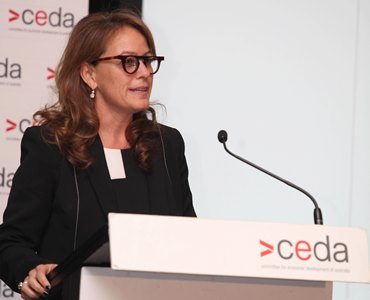“Experienced, talented and educated women represent an economic resource in this country that is being under-utilised,” Best & Less Chief Executive Officer, Holly Kramer said at a CEDA event in Sydney.

"Our female participation rate in the workforce is four percentage points below New Zealand and Canada," she said.
"If we were able to increase the participation rate just to equal those countries … we’d have an additional 240,000 people in the workforce."
Ms Kramer cited a Grattan report from 2012 that stated that if Australia had women participating at that rate, our economy could grow by $25 billion.
"Delivering these benefits requires women to participate in the workforce at all levels of management," she said.
"Female leadership does help bring down barriers that prevent women from entering and then re-entering and then moving up through the workforce with the same agility that their male counterparts are able to do.
"Having visible female role models is a critical enabler of young women moving into senior roles in organisations.
"Unfortunately, one-third of organisations have no key management personnel who are female.
"A lack of female leadership only then perpetuates that gap as future generations work their way into their careers, and business and government, and every other sector of our economy."
Ms Kramer said business can’t do it alone; they need the support of government and government agencies.
"We need to increase the quality and supply of child care and also make it available to those who require support in the home and to make it more affordable through tax deductibility," she said.
"The tax system should also favour the second income earner and consider providing a marginal benefit where both parents are going back to work.
"Both businesses and government could do much more to provide education and reskilling opportunities for women who want to re-enter the workforce after taking years off to raise their children.
"The recent initiatives announced by the Government are an encouraging step in the right direction … but there is so much left to be done."
Also speaking at the CEDA event, University of Sydney, Undergraduate Business Associate Dean and Associate Professor, Dr Rae Cooper said that Australia has the most highly sex-segregated occupational and industry divisions in the labour force than any other OECD country.
"Put simply: women work with women, men work with men," she said.
"There’s also the really critical challenge of what we call the ‘sticky floor’.
"The majority of people who are in low-paid, low-rung flat career path jobs are women."
Dr Cooper said there had been some great policy development in the last five years.
"Five years ago we didn’t have a national system for paid parental leave," she said.
"Five years ago, employees didn’t have the right to request flexible working arrangements.
"Despite that really great policy development work, there does seem to be an implementation gap between the policy and the actual practice.
"Until we see gender equality in the home outside the workplace, I find it very hard to see how we’re going to have genuine equality in the labour force and in organisations."